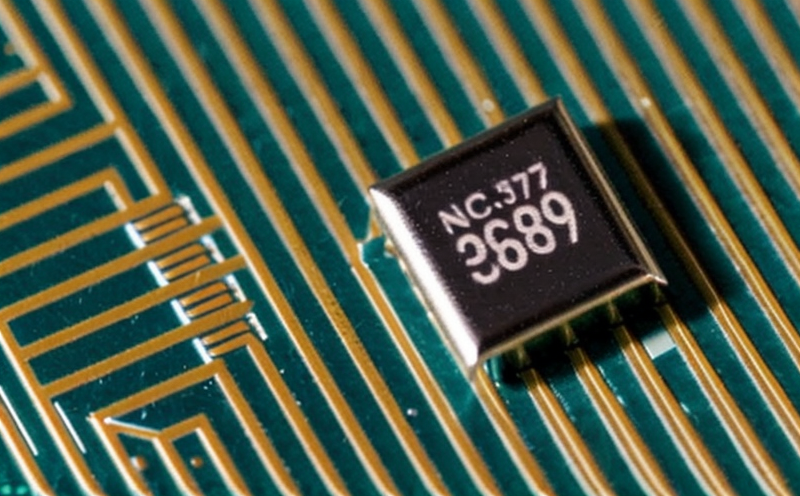JEDEC JESD22-A141 Microchip Electrical Noise Testing
The JEDEC JESD22-A141 standard is specifically designed to evaluate the electrical noise characteristics of microchips, ensuring that they meet rigorous performance criteria for reliability and stability. This testing procedure targets several critical parameters that directly influence a microchip's operational efficiency under various environmental conditions.
The primary objective of this test is to identify potential weaknesses in the chip's design or manufacturing process that could lead to signal corruption or interference. Electrical noise can cause errors, degrade performance, and ultimately impact the longevity of electronic devices. By subjecting the microchips to controlled stress tests and environmental simulations, we can ensure their robustness against these challenges.
The JESD22-A141 test method is particularly relevant for industries that rely heavily on semiconductor technology, such as automotive electronics, telecommunications, and consumer electronics. In automotive applications, for instance, it's crucial to guarantee the reliability of microchips under extreme temperature variations and electrical interference. The same principles apply to other sectors where high-performance computing or communications are paramount.
The testing process involves a series of steps that simulate real-world operating conditions. This includes exposing the chips to thermal cycles, voltage fluctuations, and electromagnetic interference (EMI). By doing so, we can accurately assess the chip's ability to withstand these stresses without degrading its performance.
- Thermal Cycling: Chips are subjected to rapid changes in temperature to mimic operating conditions in vehicles or industrial environments where they may encounter wide fluctuations.
- Voltage Stress: The chips undergo voltage swings and transients that replicate the dynamic nature of power supply systems.
- EMI Exposure: The devices are exposed to controlled levels of EMI, simulating the electromagnetic environment in which they will operate.
The testing apparatus used for JESD22-A141 is state-of-the-art and capable of precisely replicating these conditions. Our laboratory employs advanced instrumentation that ensures accurate measurement and analysis of electrical noise parameters. This includes high-precision oscilloscopes, signal generators, and spectrum analyzers.
The acceptance criteria for JESD22-A141 are strictly defined according to the standard's requirements. These include limits on acceptable levels of electrical interference, jitter, and other relevant metrics that must be met for a chip to pass the test. Meeting these criteria is essential for ensuring that microchips can operate reliably in their intended applications.
Our service offers comprehensive testing solutions tailored to meet the specific needs of clients across various industries. By leveraging our expertise in this domain, we help ensure that your products are not only compliant with industry standards but also exceed expectations in terms of reliability and performance.
Quality and Reliability Assurance
The JESD22-A141 test is just one component of a broader quality assurance strategy aimed at enhancing the overall reliability and longevity of microchips. By incorporating this test into your product development cycle, you can catch potential issues early on, reducing the risk of costly failures later in the lifecycle.
- Early Detection: Identifying electrical noise issues during initial testing allows for timely corrections, ensuring that only robust chips make it to market.
- Lifetime Optimization: Testing under realistic conditions helps predict how long a microchip will perform reliably in its intended environment.
- Compliance Assurance: Ensuring compliance with industry standards like JESD22-A141 is crucial for meeting regulatory requirements and gaining market acceptance.
In addition to the technical aspects of testing, our approach emphasizes continuous improvement. We work closely with clients to understand their specific needs and challenges, providing customized solutions that go beyond mere compliance. By integrating best practices into your manufacturing processes, we help you build a competitive advantage through superior product quality.
The results from JESD22-A141 testing are presented in detailed reports that include all relevant data points along with interpretations based on industry standards. These insights enable decision-makers to make informed choices about future developments and optimizations. Moreover, the standardized reporting format facilitates seamless integration into existing quality management systems.
Environmental and Sustainability Contributions
The JESD22-A141 testing process plays a significant role in supporting environmental sustainability efforts within the semiconductor industry. By ensuring that microchips are robust against electrical noise, we contribute to reducing waste associated with premature failures or replacements.
One of the key benefits of this test is its ability to extend the operational life span of microchips. Longer-lasting components mean fewer replacements and less electronic waste, which aligns directly with global sustainability goals. Furthermore, by improving the efficiency of semiconductor devices through rigorous testing, we help reduce energy consumption across various sectors.
Our laboratory's commitment to environmental responsibility extends beyond just JESD22-A141. We also offer a range of other services that contribute to sustainable practices in electronics manufacturing. These include lifecycle assessments, material selection reviews, and eco-friendly waste disposal options.
Competitive Advantage and Market Impact
The ability to deliver high-quality microchips that meet stringent reliability standards is a significant differentiator in today's competitive market. Companies that adopt advanced testing methodologies like JESD22-A141 are better positioned to gain market share by offering products with superior performance, durability, and reliability.
Meeting the exacting requirements of this test can lead to reduced warranty costs and improved customer satisfaction. Satisfied customers are more likely to become loyal patrons, recommending your products to others. This positive feedback loop fosters growth and strengthens brand reputation.
Achieving compliance with international standards such as JESD22-A141 also enhances credibility among potential partners and investors. It signals that you adhere to high ethical standards and have a commitment to excellence in product development.
Moreover, the insights gained from thorough testing can inform strategic decisions regarding future innovations. Understanding where current technologies fall short allows for targeted investment in research and development efforts aimed at overcoming these limitations.





